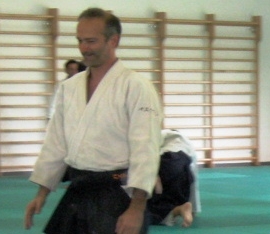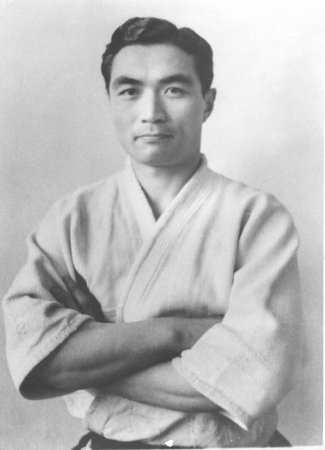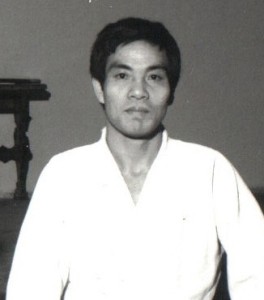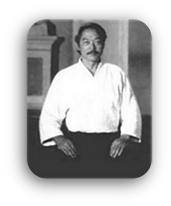 For me Aikido was love at first sight. My infatuation began in 2001 and since then I’ve never stopped. I even started teaching to a small group from 2010 on. To me Aikido means well-being. It has always made me feel better, both as practitioner and as a teacher. It is a wonderful discipline and I will always be grateful to the one who first introduced me to it and unveiled Aikido to me. But it’s not all a bed of roses…
For me Aikido was love at first sight. My infatuation began in 2001 and since then I’ve never stopped. I even started teaching to a small group from 2010 on. To me Aikido means well-being. It has always made me feel better, both as practitioner and as a teacher. It is a wonderful discipline and I will always be grateful to the one who first introduced me to it and unveiled Aikido to me. But it’s not all a bed of roses…
It may sound strange from the outside, but the world of Aikido is one of jealousy, conflicts, envy, small talk, more often than healthy practice. I find some comfort in reasoning that modern Budo is forced (?) to be structured in federations and associations. Therefore it is natural that, like for all groups made of people, those things happen even if they are very far from the concepts of harmony, love, self-improvement that should be the basics for this kind of practice. I’m still a believer, otherwise I would quit. But sometimes I’m depressed. I’m depressed when I see certain masters boast about their dan ranks on social networks. I’m depressed when I see that each group is convinced to be the best. I’m depressed when I have to admit that the more we try to be true, the more we use our own judgement, the more we try to be free in our choices, the more they tell you what to do, the more they point a finger to you, the more you are isolated. But I keep going, convinced that the original message of this practice is the well-being, both physical and psychological. So I establish strong bonds with those who are convinced as well, like castaways in the storm do to give strength to each other. And I dream about an Aikido that would be pure practice, tough practice, strenuous, demanding – no small talks, no frills. I read about the big masters from Japan who came to the west carrying a message. Times were different = men were different? Maybe. Today’s society is based on appearances. Each of us wants to be noted and each of us is the starring character in our own tiny private worlds. Ego, ego, ego…
Yet, the founder was convinced that Aikido made people better! Maybe I’m wrong, it really works: people would have even been worse without Aikido! 😉
Or maybe all this is necessary. According to Shinto mythology, the spiritual foundations of Aikido, the gods purposely hid the spiritual principles, certain that humanity should first experience materialism and technological rationality in order to really grasp spirituality one day. So maybe Aikido, the dance of gods, must first immerse itself in the material world, experimenting the pure formality of technique, chasing the mirage of rankings, the wish of appearing shiny during our fabulous technique, filling the mats (and the pockets) while making Budo a sport or a business. Only after having experienced all this, Aikido will be able to find again its roots, the deep meaning of practice. After all, this is the natural path for each one of us: at the beginning there can only be technique; only after having experimented with all its forms, we can get rid of it and express ourselves freely. A musician incessantly trains mechanical gestures that, once deeply acquired, can be forgotten while playing, after letting go to feelings, to passion, to art. This is how I find comfort, therefore I go on.
 I think about the masters of the past who came from Japan. I think about Hiroshi Tada, founder of Italy’s Aikikai, a moral institution, an association of traditional Japanese culture. Not a sport institution: while at lunch, someone proposed Tada sensei to work so that the Italian Sports Committee (CONI) would recognize the Aikikai of Italy. Tada sensei said nothing. He stood up and went away. We go on creating different sports associations and strive to obtain the Sports Committee recognition while we are not practicing a sport!
I think about the masters of the past who came from Japan. I think about Hiroshi Tada, founder of Italy’s Aikikai, a moral institution, an association of traditional Japanese culture. Not a sport institution: while at lunch, someone proposed Tada sensei to work so that the Italian Sports Committee (CONI) would recognize the Aikikai of Italy. Tada sensei said nothing. He stood up and went away. We go on creating different sports associations and strive to obtain the Sports Committee recognition while we are not practicing a sport!  I think about Hideki Hosokawa, descendant of a noble samurai family for which even Myamoto Musashi served. Hoskawa came to Italy on Tada’s request, his first teacher (who had him do tenkan for one week and kaiten for another when Hosokawa began). Hosokawa was supposed to help Tada in managing the Aikikai. Unfortunately he had to quit for health reasons in 2004. To him a martial art “is a concept which implies a number of categories completely different from tall and short, fast and slow, aesthetic or unaesthetic, strong or weak. Here, being 20 or 40 years old, being the fastest in the world, jumping 2.15 m high means just nothing”. “In sports only winning matters, no matter how; I don’t care if in order to obtain a K.O. I destroy a man. Budo it is different”. “Do we won’t to practice Aikido or should we move to Judo? In other words, are we worth of an art, or should we be satisfied with a sport?”
I think about Hideki Hosokawa, descendant of a noble samurai family for which even Myamoto Musashi served. Hoskawa came to Italy on Tada’s request, his first teacher (who had him do tenkan for one week and kaiten for another when Hosokawa began). Hosokawa was supposed to help Tada in managing the Aikikai. Unfortunately he had to quit for health reasons in 2004. To him a martial art “is a concept which implies a number of categories completely different from tall and short, fast and slow, aesthetic or unaesthetic, strong or weak. Here, being 20 or 40 years old, being the fastest in the world, jumping 2.15 m high means just nothing”. “In sports only winning matters, no matter how; I don’t care if in order to obtain a K.O. I destroy a man. Budo it is different”. “Do we won’t to practice Aikido or should we move to Judo? In other words, are we worth of an art, or should we be satisfied with a sport?”
 Motokage Kawamukai pioneered Aikido in Italy, but he was a businessman, not a professional aikidoka. He was among the first Japanese to teach Aikido in our country. He was the one who wrote to Aikikai’s Hombu Dojo in Tokyo so that they sent a representative and they sent Tada. Kawamukai went to the extent of saying: “you Europeans are sick, Aikido is not a medicine, and I am not your cure”.
Motokage Kawamukai pioneered Aikido in Italy, but he was a businessman, not a professional aikidoka. He was among the first Japanese to teach Aikido in our country. He was the one who wrote to Aikikai’s Hombu Dojo in Tokyo so that they sent a representative and they sent Tada. Kawamukai went to the extent of saying: “you Europeans are sick, Aikido is not a medicine, and I am not your cure”.  I also think about Hirokazu Kobayashi who was in France in the 60s. He was isolated from the big shots and official federations pointed to him like a menace, one to be avoided, since he talked about teaching freedom just like the founder, with no federal authorization.
I also think about Hirokazu Kobayashi who was in France in the 60s. He was isolated from the big shots and official federations pointed to him like a menace, one to be avoided, since he talked about teaching freedom just like the founder, with no federal authorization.
And the genius, Seigo Yamaguchi. He hated divisions and he never founded a personal school, although he had an enormous number of followers. That was also because he held the founder and the Aikikai in great respect. Yet, he disliked imitators and used to say: “Ueshiba is Ueshiba, I am Yamaguchi”. Sometimes he was late at class or even didn’t show up at all. A strong statement, one against any expression of ego.
No small talk and lot of practice. And freedom. Freedom of being ourselves, of doing our own choices while staying humble. Pretty hard, isn’t it?